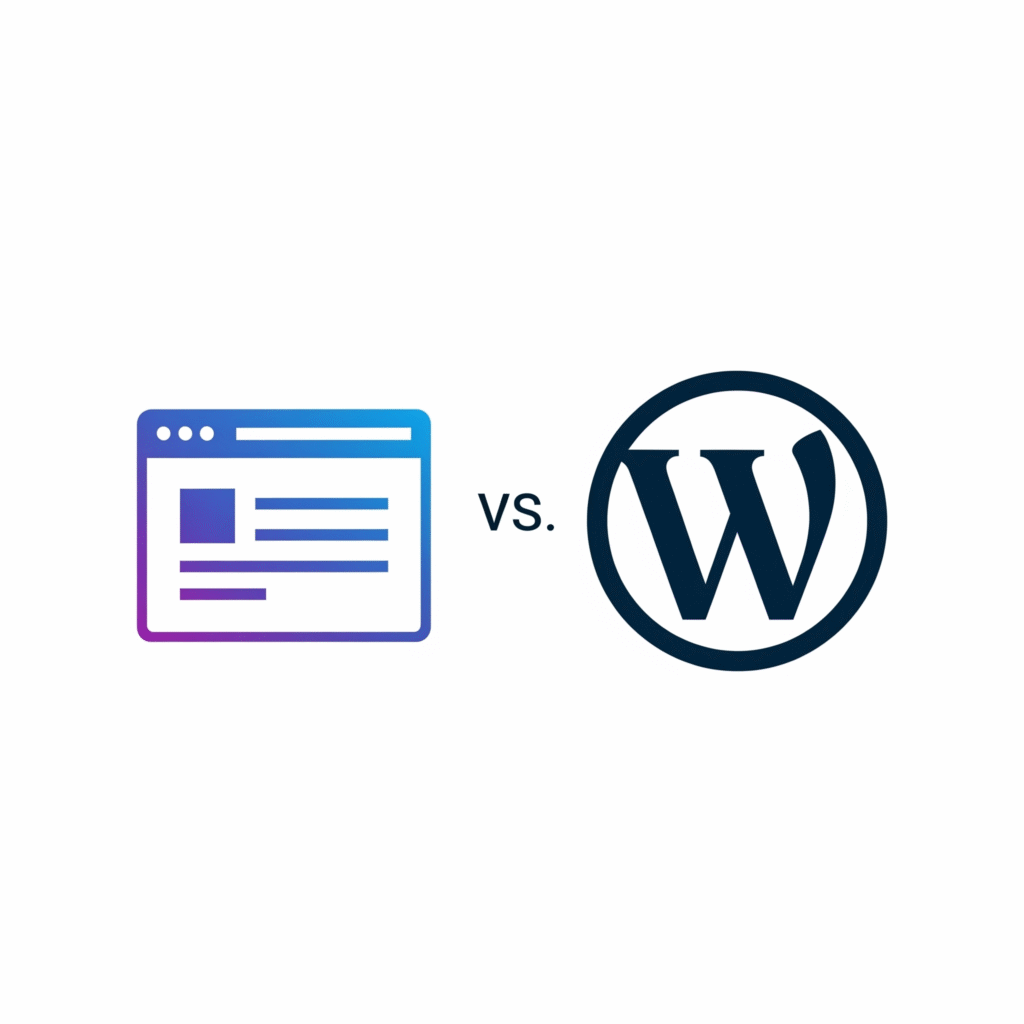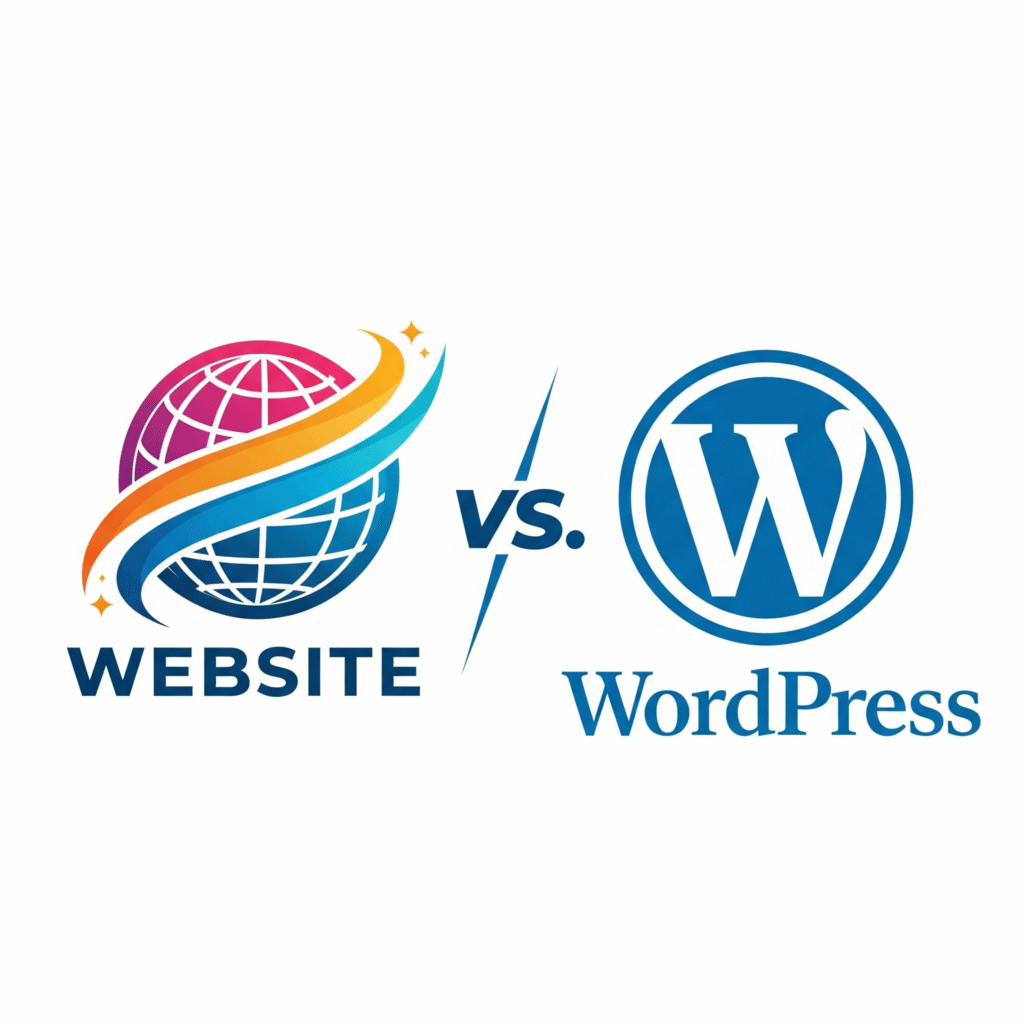Deciding between a custom website and WordPress for your business? This comprehensive guide explores the SEO, cost, flexibility, and scalability of each, helping you choose the best platform for your unique needs.
In the dynamic digital landscape, your website is often the first impression potential customers have of your brand. It’s not just an online brochure; it’s a powerful marketing tool, a lead generation machine, and for many, a direct sales channel. So, when it comes to building this crucial asset, the “Custom Website vs. WordPress” debate is a common one. Let’s break down each option to help you make an informed decision for your business.
Understanding the Landscape: Custom Websites and WordPress
Before diving into the pros and cons, let’s define what we mean by each:
- Custom Website: A custom website is built from the ground up, with every line of code, design element, and functionality tailored specifically to your business’s unique requirements. It’s a bespoke solution, much like a tailor-made suit.
- WordPress Website: WordPress is a popular Content Management System (CMS) that provides a framework for building websites. While it offers a vast array of themes and plugins that allow for significant customization, it operates within a pre-existing structure. Think of it as a highly customizable, off-the-rack suit that can be altered to fit.

The Great Debate: Custom Website vs. WordPress for Your Business
Let’s explore the key aspects to consider when making your choice:
1. Cost & Budget
Custom Website:
- Pros: While the initial investment is significantly higher, a custom website can offer a better long-term ROI for businesses with highly specific needs. You only pay for the features you need, avoiding the “bloat” that can sometimes come with pre-built platforms.
- Cons: The development costs are substantial due to the specialized skills and time required for design, coding, and testing. Maintenance can also be more complex and potentially more expensive if you don’t have in-house technical expertise.
WordPress Website:
- Pros: WordPress itself is open-source and free to use. The primary costs come from hosting, premium themes, and plugins. This makes it a much more budget-friendly option for startups and small to medium-sized businesses.
- Cons: While the core is free, some essential premium themes and plugins can add up. Without proper optimization, poorly coded themes or an excessive number of plugins can lead to performance issues that might require additional investment to fix.
2. Flexibility & Customization
Custom Website:
- Pros: This is where custom websites truly shine. You have unlimited flexibility to create any design, integrate unique functionalities, and build a user experience precisely tailored to your brand and target audience. There are no limitations imposed by templates or pre-existing frameworks.
- Cons: This immense flexibility comes with longer development times and a greater reliance on skilled developers. Any significant changes or additions will require coding expertise.
WordPress Website:
- Pros: WordPress offers remarkable flexibility through its extensive ecosystem of themes and plugins. You can achieve a highly customized look and feel without writing a single line of code. For most businesses, the available options are more than sufficient.
- Cons: While flexible, there are still inherent limitations. If your business has truly unique or complex functional requirements that aren’t addressed by existing themes or plugins, a custom solution might be necessary or require extensive custom WordPress development (which can negate the cost benefits).
3. Scalability
Custom Website:
- Pros: A custom website is built with scalability in mind from the outset. As your business grows, new features, increased traffic, and integrations can be seamlessly incorporated without being constrained by platform limitations. This future-proofs your investment.
- Cons: Scaling a custom website requires ongoing development and maintenance, which can be resource-intensive.
WordPress Website:
- Pros: WordPress is highly scalable and can handle moderate to high levels of traffic, especially with proper optimization and a robust hosting environment. Many large enterprises successfully use WordPress for various aspects of their online presence.
- Cons: For extremely high-traffic sites or those with highly complex, custom functionalities, WordPress might require significant optimization, specialized hosting, and potentially custom development work to maintain performance and stability.
4. Security
Custom Website:
- Pros: Custom websites can be designed with advanced, tailor-made security protocols, making them less susceptible to common vulnerabilities targeted by hackers on popular platforms. You have direct control over all security measures.
- Cons: Maintaining a custom website’s security requires vigilance and technical expertise. You are solely responsible for implementing and updating security features, unlike WordPress which has a large community constantly working on patches.
WordPress Website:
- Pros: WordPress benefits from a massive community that actively identifies and patches vulnerabilities. Regular updates and the use of reputable security plugins (like Sucuri, Wordfence) can significantly enhance security.
- Cons: Because of its popularity, WordPress is a frequent target for hackers. Outdated themes, plugins, or core WordPress versions can create security loopholes. Proper maintenance and security practices are crucial.

5. Ease of Use & Maintenance
Custom Website:
- Pros: Once built, the backend of a custom website can be designed to be incredibly intuitive and streamlined for your specific needs, making content updates and basic management easy.
- Cons: Significant changes or troubleshooting typically require a developer. Non-technical users might find it challenging to manage aspects beyond basic content updates.
WordPress Website:
- Pros: WordPress is renowned for its user-friendly interface. With its intuitive dashboard and visual editors, non-technical users can easily publish content, manage pages, and update many aspects of their website without coding knowledge.
- Cons: While easy for basic tasks, managing a large number of plugins, themes, and updates can become complex. Plugin conflicts, compatibility issues, and troubleshooting can sometimes require technical assistance.
SEO Considerations: A Deep Dive
SEO (Search Engine Optimization) is paramount for any business aiming to be found online. Both custom websites and WordPress can be highly optimized for search engines, but their approaches differ.
SEO for Custom Websites:
- Advantages:
- Clean Code: Custom sites can be built with exceptionally clean and lightweight code, leading to faster loading times – a critical SEO ranking factor. Unnecessary “bloat” often found in themes and plugins is eliminated.
- Tailored Structure: You have complete control over the website’s architecture, URL structure, and internal linking strategy, allowing for meticulous optimization for specific keywords and user journeys.
- Performance Optimization: Every aspect of a custom site can be fine-tuned for optimal performance, from image compression to server response times, directly impacting SEO.
- Schema Markup Implementation: Advanced schema markup can be precisely implemented to enhance how your content appears in search results (rich snippets), improving click-through rates.
- Clean Code: Custom sites can be built with exceptionally clean and lightweight code, leading to faster loading times – a critical SEO ranking factor. Unnecessary “bloat” often found in themes and plugins is eliminated.
- Disadvantages:
- Manual SEO Implementation: All SEO features, from meta tags to XML sitemaps, need to be manually coded and implemented. This requires deep SEO knowledge and ongoing effort.
- No Built-in Tools: You won’t have the convenience of built-in SEO tools or plugins to guide you, meaning you’ll need to rely on external analytics and SEO software.
- Manual SEO Implementation: All SEO features, from meta tags to XML sitemaps, need to be manually coded and implemented. This requires deep SEO knowledge and ongoing effort.
SEO for WordPress Websites:
- Advantages:
- SEO-Friendly Out-of-the-Box: WordPress is inherently structured in an SEO-friendly way. Its clear hierarchy and permalink options are beneficial for search engines.
- Powerful SEO Plugins: WordPress boasts an unparalleled ecosystem of SEO plugins like Yoast SEO and Rank Math. These plugins make it incredibly easy for users to:
- Optimize titles and meta descriptions.
- Create XML sitemaps.
- Manage canonical tags.
- Implement schema markup.
- Analyze content for keyword density and readability.
- Suggest internal links.
- Content Management: WordPress’s intuitive content editor makes it easy to regularly publish fresh, keyword-rich content (blog posts, articles), which is crucial for ongoing SEO success.
- Mobile Responsiveness: Most modern WordPress themes are inherently responsive, ensuring a good user experience across devices, which is a significant SEO factor.
- SEO-Friendly Out-of-the-Box: WordPress is inherently structured in an SEO-friendly way. Its clear hierarchy and permalink options are beneficial for search engines.
- Disadvantages:
- Plugin Overload: Too many plugins, especially poorly coded ones, can slow down your site and negatively impact SEO performance.
- Theme Quality: Some themes can have bloated code or poor SEO practices built-in, requiring additional optimization efforts.
- Dependency on Updates: Relying on plugins means you’re dependent on their developers for updates and compatibility, which can sometimes lead to issues.
- Plugin Overload: Too many plugins, especially poorly coded ones, can slow down your site and negatively impact SEO performance.
When to Choose Which Option?
Choose a Custom Website if:
- You have a large budget and are looking for a significant, long-term investment.
- Your business has highly unique functionalities, integrations, or a complex user flow that cannot be achieved with off-the-shelf solutions.
- You require absolute creative control over every design element and user experience.
- Scalability for massive growth with highly specific technical requirements is a top priority.
- You prioritize bespoke security measures and have the resources for dedicated maintenance.
- Your brand requires a distinctive digital presence that sets you completely apart from competitors.
Choose a WordPress Website if:
- You have a moderate to limited budget and need to get online quickly and cost-effectively.
- Your business needs standard website functionalities (e.g., blogging, e-commerce, portfolios, contact forms) that are well-supported by themes and plugins.
- You value ease of use and management for content updates by non-technical team members.
- Speed of deployment is important.
- You want access to a vast community and extensive support resources.
- You’re comfortable with leveraging existing themes and plugins for design and functionality, even if it means some limitations on extreme customization.
- You are looking for strong SEO capabilities that can be easily managed with user-friendly plugins.
Both custom websites and WordPress offer viable paths to a successful online presence for your business. The “better” choice isn’t universal; it hinges entirely on your specific business goals, budget, technical resources, and desired level of control and uniqueness.
For most small to medium-sized businesses, start-ups, bloggers, and even many e-commerce ventures, WordPress provides an incredibly robust, flexible, and cost-effective solution with powerful SEO capabilities. However, for large enterprises, highly specialized applications, or businesses with truly unique and complex functional requirements, a custom-built website offers unparalleled freedom and scalability.